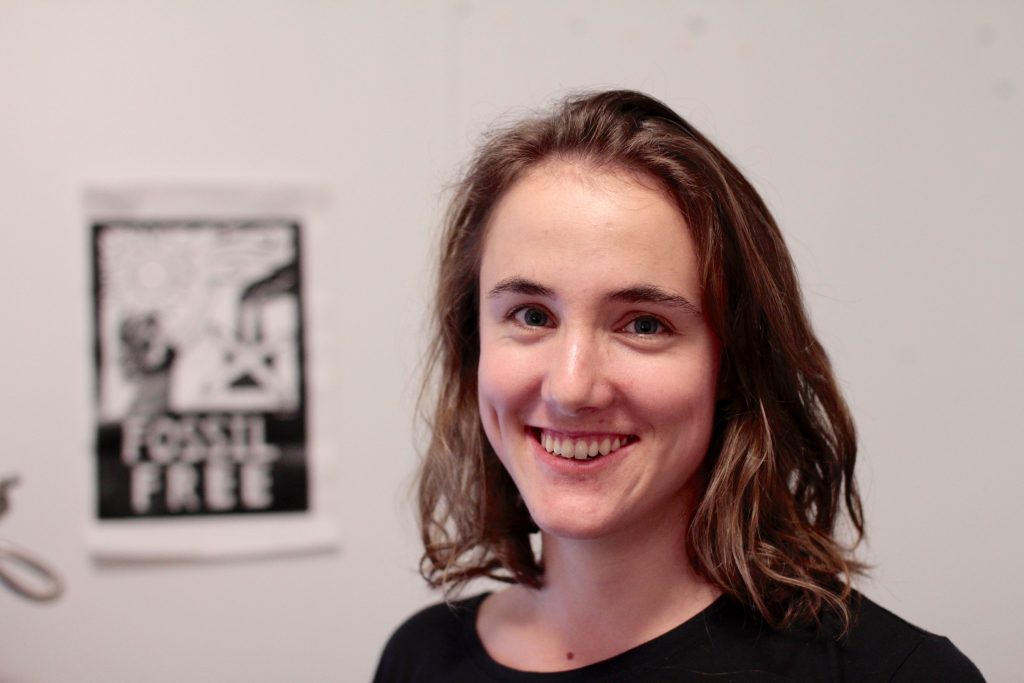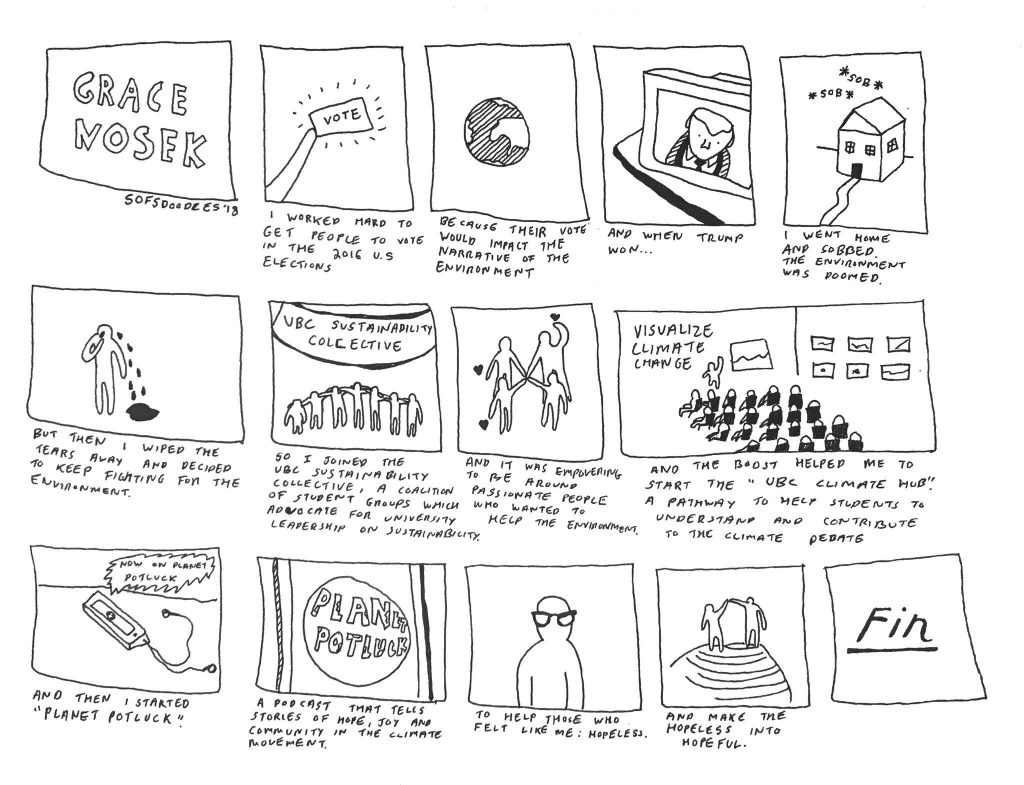Today I had the pleasure of sitting down with Arianna, a member of UBCC350, to chat about her work with with climate action. She is extremely passionate about climate work and I loved learning more about what she does. I heard about UBCC350 through conversations with Arianna, and find the group’s work fascinating.
How did you get involved in C350?
I grew up in Nelson, BC, and my mom is a teacher, and she did a lot of social justice things in her teaching. She had a class called Social Justice for students in grades 11 and 12, and when I was 9 years old, the one moment I remember was when they organized a rally. It was a march from the town to the lake, and it was about climate change and how scary it is. There were people with speeches and at the end of the rally, we made a shape with all the people there to write out the numbers “350” to represent 350 parts per million CO2 in the atmosphere. Everyone had a lantern or a flashlight and they took an aerial photo. It was an international day of action, so people were taking photos like this all over the world. It was my first exposure to the group C350.
In high school, I would organize people for projects like composting and running a garden. I got frustrated because it was just me and some friends, running around and yelling at people to compost, and we would cut up the compost so it would compost properly. It felt like it was just me. I also kept learning about the enormity of the problem, and the solutions didn’t add up- we need to do a lot more.
When I came to UBC, on November 1st during my first year, I attended an anti-Kinder Morgan pipeline rally. I went with friends and there were 4000 people there. Coming from a town of 10,000, I thought it was crazy that that many people cared when I felt like I was the only one before. There were people from all over and in different age groups.
Kate Hodgson talked at the rally about C350 about organizing for climate justice. Kate was in my French class and kept talking about it. In January I worked up the nerve to go to a C350 meeting. They were all welcoming and had such an organized structure, which reminded me of my mom’s class and their rally- it was very organized. They said they needed someone to write things, and I said that I don’t know anything, but that I’d do it. I learned so much in the next two weeks and haven’t stopped learning ever since.

Arianna, a member of UBC C350
What does sustainability mean to you?
I’m not a huge fan of the word sustainability, I think it’s a buzzword we don’t take the time to define. I think technically it means to sustain, or the ability to sustain something over time. In an environmental way, that means thinking longer term rather than the short term of a lifespan, or political cycle, or product cycle- thinking beyond those paradigms we have fallen into.
I think I fall mostly into the climate movement, while others fall into the sustainability movement. I think there is overlap but that they aren’t the same. For example, a closed-loop-system (a sustainability concept) contributes to emission reduction. But also I feel like sustainability is too soft of a word to encapsulate the human impact on the environment and how we can incorporate the justice and human aspect of climate change.
I see sustainability as working within the systems we have now, and climate justice as deconstructing systems and changing them. We can’t solve the the problem while we’re inside of the problem. Capitalism and consumerism impacts the environment, and we need to look at who bares the costs and benefits of resource extraction. I think we need to take the power from corporations to the community. We can’t be sustainable with the global reach we have now. I think everything needs to decentralize and be community-focused.
What does C350 do?
C350 is a political climate action group that advocates for climate justice through action for systemic solutions. We work on divestment from fossil fuels, so asking UBC to take its money that is invested in fossil fuels and invest it elsewhere, in a shift that’s consistent with the university’s image as a sustainable institution *suggestive cough*. We also do solidarity work with First Nations groups, like recently, the Wet’suwet’en First Nation. We meet on Wednesdays from 6-7pm in the Nest and are open to all!

What work are you most excited about?
This year, I’m coordinating folks working on the divestment campaign. We have a lot of new people who are capable and keen, and I love the community aspect of C350. It’s awesome to see people stepping up and adding their creativity to the project. In Canada, divestment as a tactic is growing because it targets institutions and asks them to act consistently with the urgency of climate change. It’s a way of “fighting the power”- breaking down who holds power and asking them to listen to students. So in that way, it’s a mechanism of decolonizing the climate and movement toward justice. It’s exciting because it’s so important! And it prioritizes people and the community.
There are so many things I loved about this conversation! My favorite part was her take on the word sustainability- we heard so many definitions of sustainability in our class, but no one mentioned the “softness” and popularity of the word. I think she is right- to solve the disastrous environmental issues that face our planet at the moment- maybe something bigger and stronger than sustainability is needed. Maybe we need to rework the systems that we exist in and look at business more critically. Her message about recreating the system instead of trying to solve the problem within the existing system reminds me of a quote from Hamilton, my favorite musical- “If there’s a fire you’re trying to douse, you can’t put it out from inside the house“.
Although we often look at business as a solution to climate issues in our sustainability marketing class, Arianna has a different perspective, about the need to decentralize big business and move more towards a community-based society. I think that is what she’s doing with C350 towards UBC, if you look at UBC as a business. The university is invested in fossil fuels in order to grow as a business and make money. However, there are financial benefits to divestment from fossil fuels, divestment aligns with the UBC value of sustainability, and divestment would align with the values of many UBC students and faculty members who have fought for divestment. Despite these benefits and years of protest, UBC still has approximately $85 million invested in fossil fuels (based on an article from 2016, but there has been little progress). If businesses like UBC are so slow to change, and the need for climate action is so urgent, maybe they’re not the most effective way to address the climate issue. Maybe they need to be restructured completely in order to be less detrimental to the climate and the communities around them.
This organization is much different than the Sustainability Ambassador group I spoke with last week. C350 is more politically-driven, and that they are very focused in their goals. The group provides an awesome, action-focused involvement opportunity for those passionate about solving climate issues. The group is also less associated with UBC, and they do a lot of high-level activism towards the institution. I’m super impressed by Arianna and the work that the group does here at UBC and beyond!
Do you agree with Arianna’s take on the word sustainability? Let me know in the comments below!

